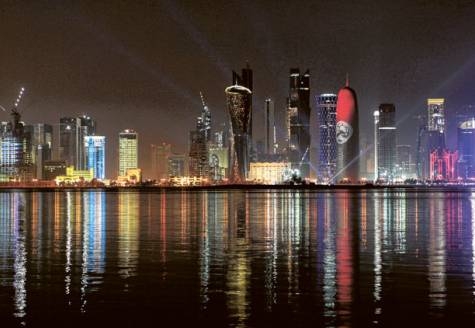The move comes despite a backdrop of deteriorating global prospects, the multilateral lender said.
It expects the regional economy to expand this year by 5.5 per cent, up from the IMF's previous forecast in April of 4.2 per cent.
But the fund trimmed its global outlook by 0.1 percentage points to 3.5 per cent, citing setbacks in the euro zone and a slowdown in emerging markets.
"In contrast with the broad trends, growth in the Middle East and North Africa will be stronger in 2012-13 relative to last year, as key oil exporters continue to boost oil production and domestic demand while activity in Libya is rebounding rapidly after the unrest in 2011," officials wrote in the report, which was released yesterday.
Growth is expected to subside to 3.7 per cent next year. Oil prices will fall back from an average of US$104 per barrel last year to $102 this year, before sliding further to $94 next year, the IMF projected.
Prices were calculated based on an assumed average price across European Brent, West Texas intermediate and Dubai crude.
The more positive outlook for the region is an indication of the greater stability in the Mena region since uprisings sparked unrest in several Arab countries last year.
It also reflects income from strong oil output in the GCC, along with high spending on areas such as infrastructure and public sector wages by governments. In January, the Executive Council in Abu Dhabi gave the go-ahead for a host of projects including Abu Dhabi International Airport's Midfield Terminal and projects on Saadiyat Island.
But the IMF warned the global outlook remained uncertain.
It said the most immediate risk to the global recovery was that delayed or insufficient policy would further stoke the euro-area crisis.
"Simply put, the euro periphery countries have to succeed," said Olivier Blanchard, IMF chief economist and director of the IMF's research department.
It based its revised outlook on the assumption that there would be enough policy action for financial conditions in the euro-zone periphery of Spain, Portugal, Italy, Ireland and Greece to ease gradually over next year.
Deterioration in sovereign-debt markets showed pressing ahead with banking and fiscal union must be a priority, it said.
The euro-zone GDP should decline by an average of 0.3 per cent this year before returning to growth of 0.7 per cent next year, the IMF estimated. A further risk the IMF flagged was that the US economy could stall as a result of excessive fiscal tightening caused by political gridlock.
"In the extreme, if policymakers fail to reach consensus on extending some temporary tax cuts and reversing deep automatic spending cuts, the US economy could face a steep decline of more than 4 per cent of GDP in its fiscal deficit in 2013," said Mr Blanchard.
The so-called fiscal cliff would cause a severe dip in US growth with "significant spillovers to the rest of the world," he said. The IMF urged the US to act to raise its federal debt ceiling.
The IMF lowered its projection for US growth slightly to 2 per cent this year and 2.3 per cent next year.
Finally, steps by some emerging-market economies to stimulate growth needed to gain traction, it said. Growth has slowed in a number of emerging economies, especially Brazil, China and India, due to softer global conditions and a sharp deceleration in domestic demand as a result of capacity constraints and policy tightening, it said. IMF forecasts for average expansion in the main emerging and developing economies were 5.6 per cent this year and 5.9 per cent next year, both down slightly from earlier projections.
The National
Jul 17























































